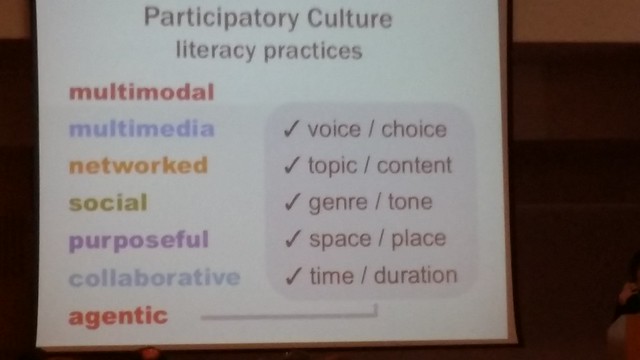If ‘open’ is the answer, what is the question? #OER16
Catherine Cronin’s keynote was the first session at the OER16 conference and was live streamed with a recording here in case you missed it.
Catherine started a conversation around the subject of the keynote more than a month before at her blog and #OER16 on Twitter, indicative of her commitment to open scholarship. The conversation attracted 27 comments so the engagement long preceded the actual keynote.
She started her keynote by situating her own scholarship within a network of scholars, many of whom were in the room (or on the #OER16 hash tag), and acknowledging earlier scholars like Mary Somerville and other influences such as poetry e.g. @byleaveswelive. Catherine spent a few minutes promoting networking by encouraging us to talk with someone we didn’t already know.
Catherine showed mural that evoked the popular movement around the Irish marriage referendum #marref and the role of social media in this movement, encouraging people to vote, and even come home to vote from all parts of the world.
This was an example what Henry Jenkins called the participatory culture that has its own practices
Catherine explored:
- interpretations of Open – educational practices, educational resources, and admission to education e.g. Open University and
- levels of Open – policy/culture, values, paractices and activities
Catherine highlighted some ongoing work she instigated with @vivienrolfe at http://wikieducator.org/GoOPEN
She acknowledged work done by Richard Edwards, Sava Singh, Jeremy Knox, Suzan Koseoglu and others speaking at #OER16.
In her PhD research, Catherine has come across how important it is for people to balance privacy and openness. Openness is personal – with decisions to be made about whether to share , with whom, as whom, and what to share.
One question probed whether or not Open Educational Practices are moving apart from the Open Educational Resources in the title of the conference. Catherine saw her input as equalising the emphasis rather than eliminating the importance of the content/ resources.
Another question asked about the permissive nature of multiple definitions of openness and stressed the importance of freedom flowing from open. Catherine stressed the importance of context, in exploring who may be left out.
“Move from access to equity and justice” McMillam Cottom, 2015. The last questioner homed in on the issue of Open Textbooks and their role in such a move if used to deflect funding in public education.

![LARGE MURAL BY JOE CASLIN [SAME-SEX MARRIAGE] REF-103588](https://farm8.staticflickr.com/7694/17177200132_e0f7cc8473_z.jpg)
